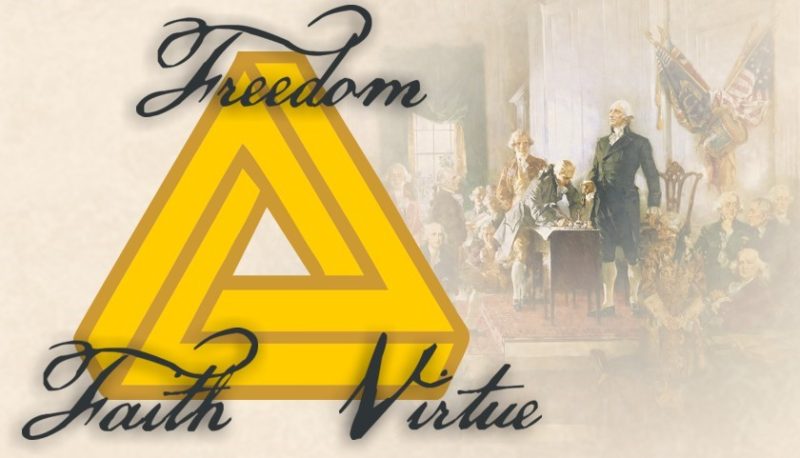What does it take to sustain freedom?
Freedom isn’t the natural condition of fallen human beings. Our default setting is bondage, either internally through various addictions and idolatries, or externally through tyranny. Freedom is fragile and requires a precise ideological ecosystem to sustain.
As we often say, ideas have consequences. In the 18th century, two revolutions were fought over liberty.
The French Revolution resulted in “the Reign of Terror” between 1793-94. More than 40,000 people were guillotined. This bloody chaos gave way to tyrannical rule under Napoleon Bonaparte. By contrast, the American Revolution gave rise to the freest, most prosperous nation in the history of the world.
Why the different outcomes? While both revolutions were fought in the name of liberty, their conceptions about liberty were completely different.
The French revolution was explicitly secular. The National Assembly of France published the “Declaration of the Rights of Man and of the Citizen.” Its assertions include:
- The principle of all sovereignty resides essentially in the nation.
- Liberty consists in the freedom to do everything which injures no one else.
America’s Founding Fathers established government on God. “All men are created equal, and are endowed by their Creator with certain unalienable rights.” Ultimate authority or sovereignty doesn’t reside with the nation or its government, but with God. Because God exists, freedom results when we live in harmony with God, His moral law, and His created order.
We all know this from everyday experience. If you believed liberty consists of the freedom to do anything which injures no one else, you would be “free” to abuse alcohol or opioids, so long as it didn’t harm anyone. But anyone who has abused these substances knows perfectly well that they are not free. They are in bondage to sinful desires.
The biblical understanding of freedom
If, however, you believe freedom comes from living within God’s moral law, you will avoid addiction and will be free indeed. This is a very biblical understanding of freedom. Jesus said, “If you continue in My Word, you are truly My disciples. Then you will know the truth, and the truth will set you free.”
Os Guinness powerfully summarized this as “the Golden Triangle of Freedom.”  True freedom requires virtue, or the commitment to do what is true, right and good. This, in turn, requires a religious commitment to God, or faith. This faith, in turn, cannot be compelled. It must be freely chosen. So true religious faith requires freedom.
True freedom requires virtue, or the commitment to do what is true, right and good. This, in turn, requires a religious commitment to God, or faith. This faith, in turn, cannot be compelled. It must be freely chosen. So true religious faith requires freedom.
Let’s unpack these in light of Bill Barr’s powerful Notre Dame speech.
Freedom requires virtue. To make this point, Barr quoted Edmond Burke:
Men are qualified for civil liberty, in exact proportion to their disposition to put chains upon their own appetites. … Society cannot exist unless a controlling power be placed somewhere; and the less of it there is within, the more there must be without. It is ordained in the eternal constitution of things that men’s intemperate minds cannot be free. Their passions forge their fetters.
But this ability to “put chains upon their appetites,” in other words, to be self-controlled and self-governed, requires a fear of God, and a desire to honor and please him. It requires faith.
Barr quotes John Adams:
We have no government armed with power capable of contending with human passions unbridled by morality and religion. Avarice, ambition, revenge, or gallantry, would break the strongest cords of our Constitution as a whale goes through a net. Our Constitution was made only for a moral and religious people. It is wholly inadequate to the government of any other.
Freedom and faith are linked
Barr then summarizes, pointing to the link between faith and freedom.
From the Founding Era onward, there was strong consensus about the centrality of religious liberty in the United States. The imperative of protecting religious freedom was not just a nod in the direction of piety. It reflects the Framers’ belief that religion was indispensable to sustaining our free system of government.
This powerful, biblical understanding of freedom, the golden triangle of freedom that inextricably links freedom to virtue, virtue to faith, and faith to freedom, is America’s crown jewel. It is our most precious idea, and one that was uniquely American. Without this idea, strong, alive, and nurtured in each successive generation, there is no America. This is at the very core of our national identity. This idea is the gift that God has given us to share with other nations and to bless the world.
In our day, however, this view of freedom is on life-support, and we may lose it. A new generation of leaders has emerged that has traded the American understanding of freedom for the secularized view of the French Revolutionaries, and we know where that idea leads. It leads to the loss of freedom, and ultimately to bloody tyranny.
May that not happen on our watch. May we cherish the inheritance granted us by the founding fathers, the golden triangle of freedom, based on a commitment to do what is good and right, because ultimately, In God We Trust.
This was originally posted to the blog for Darrow Miller and Friends on November 21, 2019. Gary Brumbelow contributed to this post.
To take this content further, listen to the podcast episode for Tuesday, April 26, 2022 on Secularism’s Pseudo-freedom from the podcast Ideas Have Consequences.




